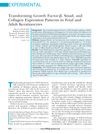 245 citations,
January 2018 in “Bone Research”
245 citations,
January 2018 in “Bone Research” TGF-β is crucial for tissue repair and can cause diseases if not properly regulated.
 168 citations,
August 2000 in “American Journal of Pathology”
168 citations,
August 2000 in “American Journal of Pathology” Fibromodulin might help reduce scarring if increased in adult wounds like in fetal skin that heals without scars.
 109 citations,
December 2003 in “American Journal of Pathology”
109 citations,
December 2003 in “American Journal of Pathology” Fetal wound healing changes with development, affecting inflammation and collagen, which may influence scarring.
96 citations,
December 2018 in “Immunity” Targeting TGFβ can improve skin immunity in older people.
 92 citations,
June 2005 in “Journal of Investigative Dermatology”
92 citations,
June 2005 in “Journal of Investigative Dermatology” All-trans retinoic acid causes hair loss by increasing TGF-β2 in hair follicle cells.
 64 citations,
March 2005 in “Journal of Investigative Dermatology”
64 citations,
March 2005 in “Journal of Investigative Dermatology” Brain-Derived Neurotrophic Factor (BDNF) slows down hair growth and promotes hair follicle regression.
 60 citations,
May 2014 in “British Journal of Dermatology”
60 citations,
May 2014 in “British Journal of Dermatology” Caffeine affects hair growth and health differently in men and women.
 56 citations,
September 2013 in “Journal of Biochemistry and Molecular Biology”
56 citations,
September 2013 in “Journal of Biochemistry and Molecular Biology” Androgens increase a growth factor in hair cells by creating reactive oxygen species, and antioxidants might help treat hair loss.
 32 citations,
March 2014 in “PLOS ONE”
32 citations,
March 2014 in “PLOS ONE” Mice lacking fibromodulin have disrupted healing patterns, leading to abnormal skin repair and scarring.
 22 citations,
January 2014 in “Biological & Pharmaceutical Bulletin”
22 citations,
January 2014 in “Biological & Pharmaceutical Bulletin” Ginsenoside F2 may help prevent hair loss and promote hair growth better than finasteride.
 18 citations,
July 2016 in “Medicine”
18 citations,
July 2016 in “Medicine” Wnt/β-catenin and TGF-β pathways affect hair loss, and activating Wnt/β-catenin could be a potential treatment.
 16 citations,
February 2007 in “Plastic and Reconstructive Surgery”
16 citations,
February 2007 in “Plastic and Reconstructive Surgery” Keratinocytes show more TGF-β system activity and collagen production as they age, which might affect wound scarring.
 14 citations,
January 2016 in “Biochemical and Biophysical Research Communications”
14 citations,
January 2016 in “Biochemical and Biophysical Research Communications” Ginsenoside Re from ginseng may help hair grow by blocking a specific growth-inhibiting pathway.
 8 citations,
January 2014 in “Annals of Dermatology”
8 citations,
January 2014 in “Annals of Dermatology” The research suggests that p63 and TGF-β1 may help determine tumor type and malignancy in hair follicle and sebaceous tumors.
![Discovery of 7-Methoxy-6-[4-(4-Methyl-1,3-Thiazol-2-yl)-1H-Imidazol-5-yl]-1,3-Benzothiazole (TASP0382088): A Potent and Selective Transforming Growth Factor-β Type I Receptor Inhibitor as a Topical Drug for Alopecia](/images/research/9620bd26-3366-4f2a-bcac-f511697bbc41/small/35997.jpg) 6 citations,
January 2013 in “Chemical & pharmaceutical bulletin/Chemical and pharmaceutical bulletin”
6 citations,
January 2013 in “Chemical & pharmaceutical bulletin/Chemical and pharmaceutical bulletin” A new compound shows promise as a topical treatment for hair loss.
 6 citations,
April 1996 in “Journal of histochemistry and cytochemistry/The journal of histochemistry and cytochemistry”
6 citations,
April 1996 in “Journal of histochemistry and cytochemistry/The journal of histochemistry and cytochemistry” TGF-alpha is present in sheep and ferret skin and may affect hair growth without directly stimulating cell proliferation.
 November 2024 in “Journal of Investigative Dermatology”
November 2024 in “Journal of Investigative Dermatology” TGF-β signaling is essential for new hair growth after wounds.
 July 2020 in “Benha Medical Journal”
July 2020 in “Benha Medical Journal” People with severe Alopecia Areata have higher levels of TGF-β1, which may play a role in the condition.
 3 citations,
February 2005 in “Aktuelle Dermatologie”
3 citations,
February 2005 in “Aktuelle Dermatologie” Prolactin and TGF-β receptor blockers might help treat hair loss.
10 citations,
November 2020 in “American Journal Of Pathology” Integrin β1 is crucial for liver structure and function, preventing fibrosis.
 49 citations,
July 2009 in “Fitoterapia”
49 citations,
July 2009 in “Fitoterapia” Essential oils from Chamaecyparis obtusa may help hair grow by increasing a growth-related gene.
 1 citations,
April 2018 in “Journal of Investigative Dermatology”
1 citations,
April 2018 in “Journal of Investigative Dermatology” People respond differently to hair loss treatment with PRP because of individual differences in growth factors from platelets.
 July 2022 in “Biomedicines”
July 2022 in “Biomedicines” 4-Aminopyridine improves skin wound healing and tissue regeneration by increasing cell growth and promoting nerve repair.
 August 1994 in “Journal of dermatological science”
August 1994 in “Journal of dermatological science” Different substances affect hair and skin cell growth in various ways.
 90 citations,
October 1996 in “Dermatologic Clinics”
90 citations,
October 1996 in “Dermatologic Clinics” Growth factors are crucial for hair development and could help treat hair diseases.
 18 citations,
January 2018 in “International journal of medical sciences”
18 citations,
January 2018 in “International journal of medical sciences” Non-thermal plasma treatment makes mouse skin thicker and increases growth factors without harming the tissue.
 11 citations,
July 2015 in “Gene”
11 citations,
July 2015 in “Gene” DHT affects bone growth by altering gene activity in osteoblasts, potentially complicating steroid use.
 7 citations,
September 2017 in “Biomedical and Pharmacology Journal”
7 citations,
September 2017 in “Biomedical and Pharmacology Journal” Growth factors greatly affect hair loss, with different levels seen in men, women, younger patients, and at the start of the condition.
 5 citations,
March 2017 in “Biomedical and Pharmacology Journal”
5 citations,
March 2017 in “Biomedical and Pharmacology Journal” Certain growth factors significantly affect hair loss in women with telogen effluvium.
 2 citations,
August 2023 in “Marine drugs”
2 citations,
August 2023 in “Marine drugs” Collagen from tilapia scales may improve hair and skin health by reducing stress and inflammation and encouraging hair growth.














![Discovery of 7-Methoxy-6-[4-(4-Methyl-1,3-Thiazol-2-yl)-1H-Imidazol-5-yl]-1,3-Benzothiazole (TASP0382088): A Potent and Selective Transforming Growth Factor-β Type I Receptor Inhibitor as a Topical Drug for Alopecia](/images/research/9620bd26-3366-4f2a-bcac-f511697bbc41/small/35997.jpg)













